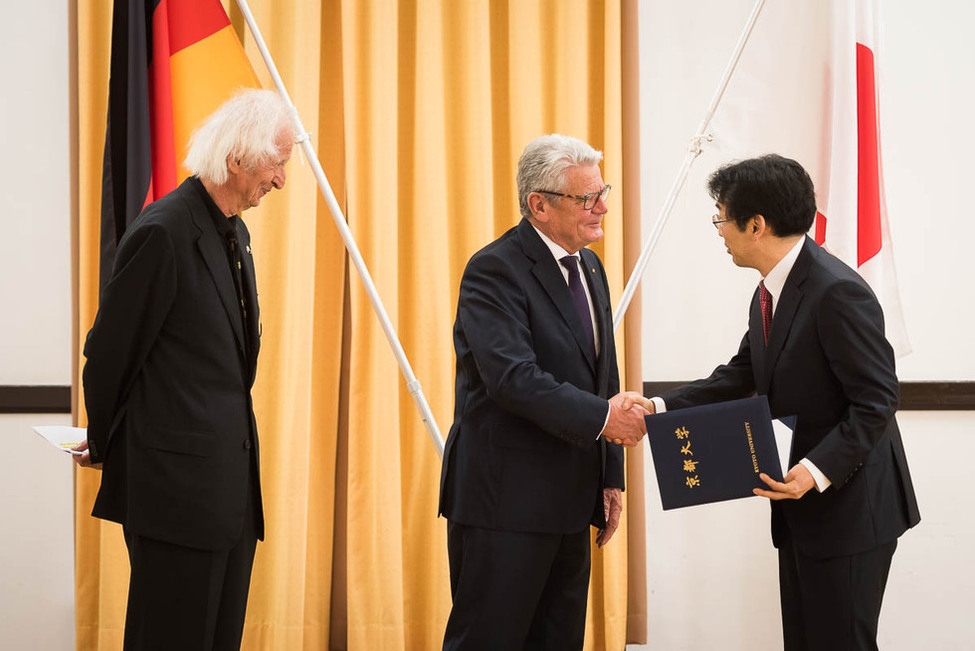In 1922 Albert Einstein, undoubtedly the most famous scientist Germany has ever brought forth, visited Japan. Here in Kyoto he delivered a lecture, and while still on his travels he noted:
I would never have forgiven myself for letting a chance to see Japan with my own eyes go by unheeded.
Numerous Germans after Einstein felt similarly. And now I feel the same way. I am delighted to be here with you today.
Einstein’s visit was a special chapter in the long history of Japanese German academic relations. A long time ago, these relations began in the field of medicine – and with the young Philipp Franz von Siebold, a doctor who was in turn to become a researcher on Japan, a universal scholar and one of the most important mediators between our two countries. This prize is rightly named after him.
It is a special honour for me to present this award here today – here at the tradition-steeped University of Kyoto, which has itself produced six Siebold prizewinners. The Siebold Prize is one of the constant factors in Japanese German cooperation and at the same time an expression of the high quality of our academic relations. The prizewinners themselves have helped to boost its attraction – although they come from very different areas of specialisation, they all share the qualities of the man it is named after: curiosity and a thirst for knowledge, openness and a willingness to cooperate across borders.
And that of course also goes for the man of letters we are honouring today – Professor Takeshi Kawasaki from the Sophia University of Tokyo. He is a scholar of German and political science and has conducted research at German universities on several occasions. Professor Kawasaki’s work is characterised not only by its academic quality but also by its political relevance. His dissertation focused on the function of the German political parties in producing political elites. The list of his academic articles reads like a compilation of the most topical issues in German politics: The party system in a united Germany
, or European integration and German domestic policy
.
Mr Kawasaki,
As an outstanding expert on German politics, but also as a member of the management board of the Japanese Society for German Studies, you have fostered understanding of German politics in Japan and also provided us in Germany with a very helpful view from outside. I would like to thank you for this.
You devote your attention to issues affecting the foundations of our political systems. Such as the question of how can democratic decision making processes succeed. Study of such complex processes – particularly academic study – is becoming even more important in a world in which authoritarian thinking and populist tendencies are gaining influence. For this reason it gives me particular pleasure to congratulate you on this year’s Siebold Prize.
For the answers to these questions that you and other academics find also unite us as democrats. Japan and Germany share fundamental values – freedom and human rights. We are committed to the rule of law and to a regulated international order. We also face very similar challenges – demographic change will shape our countries for a long time – and tackling the consequences of climate change is a joint task for Japan and Germany, and indeed for the entire international community.
That is why it is good and important that our academic cooperation is so close. For innovation and a pioneering spirit are needed to find answers to the urgent questions of our times.
The conditions for science and research in Japan are excellent. The capability of Japan as an academic nation was clearly demonstrated just a few weeks ago by the decision of the Nobel Committee to award this year’s Prize for Medicine to a Japanese scientist, as it also did in 2015 and 2012. And two years ago three Japanese material scientists received the Nobel Prize for Physics for a discovery that can now be found in almost every smartphone. And those are not even all the Nobel Prizes that have gone to Japan in recent years. Japanese scientists are leading the way in many promising areas – in nanotechnology and robotics, life sciences and environmental technology, to name but a few. And with regard to the number of patent registrations, Japan, like Germany, has been near the top of the list for many years.
Let us continue to expand our cooperation in the area of science, let us provide each other with incentives to make new discoveries!
I would like to ask all of you here in this room to do two things: to continue to work to promote Japanese German academic relations and support their future, and to ensure that this interest also remains alive among young students and doctoral candidates.


